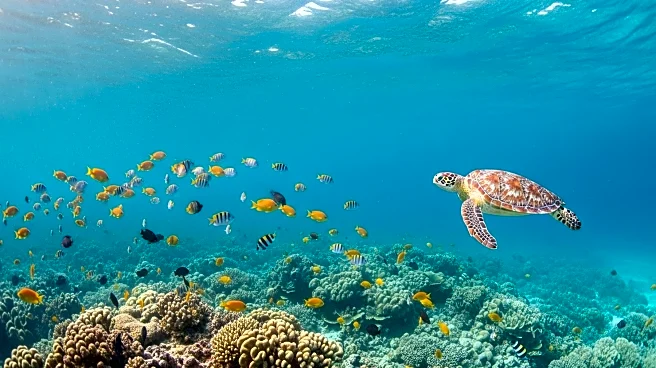What's Happening?
A significant milestone in marine conservation was achieved as Morocco became the 60th nation to sign the High Seas Treaty, enabling it to take effect next year. This treaty is the first legal framework aimed at protecting biodiversity in international waters, which constitute nearly two-thirds of the ocean and half of Earth's surface. The treaty establishes a legal process for creating marine protected areas and sets rules for activities like deep-sea mining. However, its effectiveness is uncertain as major players like the U.S., China, Russia, and Japan have yet to ratify it, potentially undermining its enforcement.
Why It's Important?
The High Seas Treaty is crucial for global marine conservation efforts, aiming to protect biodiversity and regulate activities in international waters. Its success could significantly impact marine ecosystems, which are vital for climate regulation and biodiversity. However, without ratification from major nations, enforcement may be weak, risking the treaty's objectives. The treaty's implementation is essential for achieving the '30x30' target, an international pledge to protect 30% of the planet's land and sea by 2030. The treaty's impact on global marine policy and conservation efforts is significant, but its success depends on widespread ratification.
What's Next?
Countries that have ratified the treaty will meet within a year to discuss implementation, financing, and oversight. Only ratifying countries will have voting rights, emphasizing the importance of universal ratification. The treaty's enforcement relies on individual countries regulating their own ships and companies, making global participation crucial. The next steps involve fleshing out the treaty's implementation and ensuring compliance, particularly from major fishing nations. The treaty's success will depend on collaborative efforts to protect marine biodiversity and regulate activities in international waters.
Beyond the Headlines
The treaty's ratification highlights the need for international cooperation in marine conservation. It underscores the challenges of enforcing regulations in international waters, where political boundaries are absent. The treaty's success could lead to long-term shifts in global marine policy, promoting sustainable practices and protecting marine ecosystems. However, the lack of a punitive enforcement body raises concerns about its effectiveness. The treaty's impact on small island nations, which rely heavily on marine resources, is significant, offering them a voice in global marine policy decisions.










